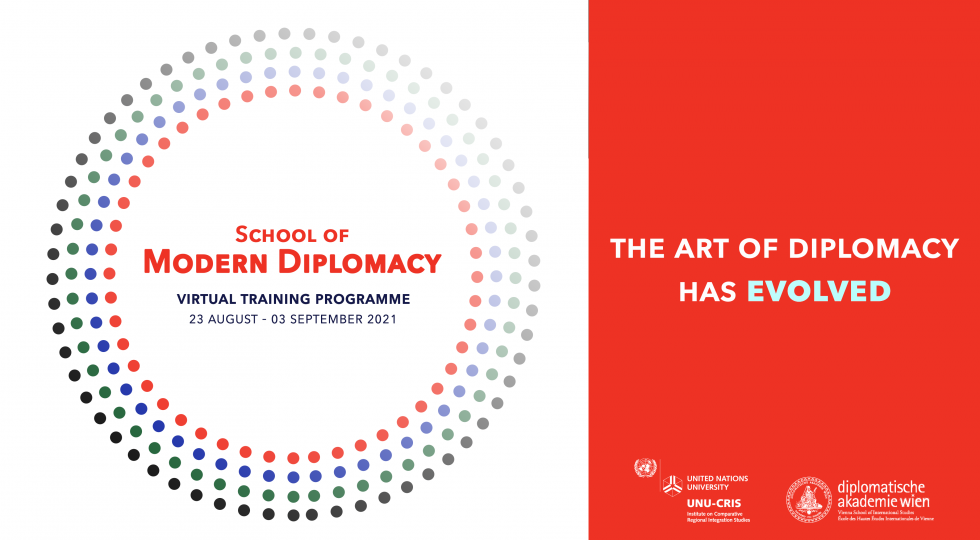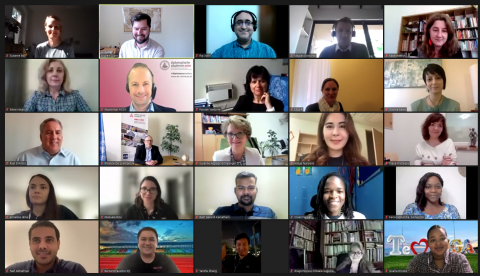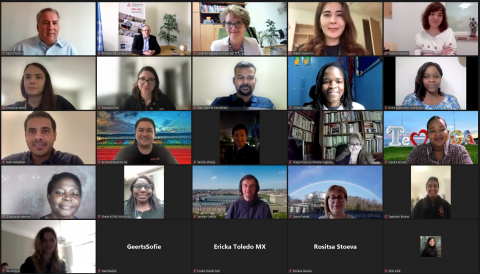Diary - School of Modern Diplomacy 2021

From the crisis in Afghanistan to the implications of Covid-19, the School of Modern Diplomacy 2021 explored the role of diplomacy in today’s tumultuous and interconnected world. Organised by UNU-CRIS and Diplomatische Akademie Wien - Vienna School of International Studies, the two-week-long summer school (23 August - 03 September 2021) combines theory and practice to present the multi-faceted and multi-actor art of diplomacy shaping global ideas and policies.
The diverse cohort comprising diplomats, scholars, entrepreneurs, and policymakers from over 25 nationalities across 6 continents received a warm, virtual welcome by Philippe De Lombaerde, Director Ad Interim of UNU-CRIS, and Susanne Keppler-Schlesinger, Deputy Director of the Diplomatische Akademie Wien - Vienna School of International Studies. Dr. De Lombaerde and Dr. Keppler-Schlesinger emphasised upon the broadened definition of modern-day diplomacy comprising new modalities, actors, and policy areas; the latter observing that today’s diplomatic practices “go beyond secret circles and ivory towers.”

Day One - Diplomatic Practice Today
The first day of the school established the larger context of diplomacy while tracing its evolution.
Andrew Cooper (Professor, the Balsillie School of International Affairs, University of Waterloo; Associate Research Fellow, United Nations University – CRIS) outlined the changing face of diplomacy in the post-cold war period. During his session, Diplomacy between Global Governance Aspirations and the Challenges of Populism and Geopolitics, Cooper shared that diplomacy in its current form is characterised by the return of geopolitics, rise of populism, positive aspirations around climate, migration and racism and the promotion of public diplomacy in expanding the horizons of democracy. The session, Challenges in Diplomatic Practice Today - Insights from a Practitioner, by Brigitta Blaha (Former Austrian Ambassador to United States, Thailand, Italy, Japan, Hong Kong, Pakistan, and Afghanistan) shared a practitioner’s perspective on the challenges and opportunities embedded within the scope of today’s diplomacy.
Day Two - Diplomatic Skills
The second day put the spotlight on the diplomatic skills needed to navigate today’s complex challenges.
The first two sessions, Leadership in International Relations: Toolkits for Modern Diplomats, by Andreas Sami Prauhart (Founding Partner, Y-Motions International; Lecturer, Diplomatische Akademie Wien - Vienna School of International Studies) unpacked the various components of ‘cosmopolitan’ leadership. The session highlighted the contribution of alliances, values, and contexts in shaping a leader, and consequently, the ‘institution’ they’re leading. Through metaphors drawn from real-life examples, the lively discussion analysed and provided tips on leading in an increasingly cross-sectional world.
The second half of the day was dedicated to the session, International Negotiations: Competence and Skills Training in Bilateral and Multilateral Negotiations, by Mona Ali Khalil (Founder and Director, MAK LAW International; Former Senior Legal Officer of the UN Office of the Legal Counsel (UNOLC), New York). Armed with her robust experience as a lawyer and negotiator, Khalil discussed the skills and competencies required in the realm of bilateral and multilateral negotiations. She emphasised upon the values of transparency, credibility, legitimacy and opennes in the process of negotiation and the need to strike a balance between power and principles. In addition, she provided practical examples and insights on the skill-driven realm of international negotiations.

Day Three - Public Diplomacy
The third day was marked by thought provoking discussions on public diplomacy.
Richard Higgott’s (Emeritus Professor of International Political Economy, University of Warwick; Research Professor, Brussels School of Governance) session outlined the the changing nature of diplomacy and the position of the EU. Specifically, he outlined the evolution of European cultural diplomacy and the current state of play. Sharing insights on ASEAN’s cultural and public diplomacy, Lee Yoong Yoong (Director of Community Affairs Directorate, ASEAN Secretariat), connected the dots between the presence of diverse actors, agendas, and regional integration. In doing so, he underscored the need for goal alignment and conflict resolution in achieving shared regional goals.
The session by Nancy Snow (Professor of Public Diplomacy, Kyoto University of Foreign Studies) examined public diplomacy from the perspective of a global practitioner and scholar. This enlightening discussion was followed by Gloria Benedikt (Visiting Fellow, Institute for Human Sciences (IWM)) sharing her valuable knowledge on the approaches to cultural diplomacy in the 21st century. Benedikt drew from her experience and deconstructed the multilateral sphere of cultural and science diplomacy through art.
Day Four - Economic Diplomacy
The various facets of economic diplomacy formed the subject matter of the summer school on day four.
Sharing their views on economic diplomacy as economists, Glenn Rayp (Professorial Fellow, United Nations University – CRIS, Professor of International Economics, Ghent University) and Samuel Standaert (Assistant Professor at Universiteit Gent and UNU-CRIS Professorial Fellow) deep dived into the trends in economic diplomacy over the past few decades. In addition, they also explored the impact and links between policymaking and economic reforms.
The next session hosted Linda Yueh (Chair of the LSE Economic Diplomacy Commission, Fellow in Economics, St Edmund Hall, University of Oxford) who examined the developments in economic diplomacy during the 21st century. Cecilia Malstrom (Former European Commissioner for Trade and Home Affairs) deconstructed ways in which trade can bring about economic and political change in national and international realms. The following session by Ulrike Ritzinger (Head of the Department for Business Services at the Austrian Ministry of Foreign Affairs Former Consul General of Austria to the US (Los Angeles)) examined business diplomacy through the lens of today’s hyperconnected and globalised world.

Day Five - Migration Diplomacy
Migration diplomacy took the center stage on the last day of the first week.
Mehari Taddele Maru (Part-time Professor, Migration Policy Centre, European University Institute; Lead Migration Expert and Chief Strategist, Intergovernmental Authority on Development (IGAD)), elucidated upon the various concepts within migration while exploring perspectives on local, national, and international levels. He also examined the nuances within the intersectional subject and stressed upon the crucial role of migration governance moving forward. Up next was the session by Teresa Albano (Economic Affairs Officer, OSCE; Office of the Co-ordinator for Economic and Environmental Activities – OCEEA) who presented multilateral migration governance using the specific case of OSCE.
The second half of the day was dedicated to City Diplomacy comprising a series of case studies and insights from various corners of the world. Janina Stürner-Siovitz (Research Fellow, Centre for Area Studies, Friedrich Alexander – University Erlangen Nurnberg), Véronique Lamontagne, (Director, Montreal International), Lionel Nzamba Nzamba (Migration Officer, United Cities and Local Governments of Africa), Fatima Fernandez (Project Officer, United Cities and Local Governments (UCLG)), Forward Maisokwadzo (Inclusion Adviser to the Mayor of Bristol) led lively sessions on subnational diplomacy emerging as a preferred way to engage with multiple agendas, actors and policy areas.

Day Six - Science and Health Diplomacy
The need for collaboration on science and health diplomacy was the main talking point on the 6th day of the School of Modern Diplomacy 2021.
Armed with his vast experience and knowledge in science diplomacy, Luk Van Langenhove (Founding Director, United Nations University – CRIS; Academic Commissioner for International Institutes and Networking, Vrije Universiteit Brussel) began the day by establishing the various ways in which science diplomacy can be used to navigate the most complicated issues of our times. In doing so, he also laid down the myriad actors, levels and intricacies defining the area of science diplomacy.
Using examples from South Asia, Jenice Jean Goveas (Department of Science and Technology (DST), Centre for Policy Research, Indian Institute of Science)) traced the current landscape, best practices, challenges and opportunities within science and technology diplomacy.
The two-part interactive session on Science Diplomacy and Global Health by Michaela Told (Senior Expert / Independent Consultant, HumanImpact5; Visiting Lecturer Global Studies Institute, University of Geneva) used the example of infectious diseases to explain the cruciality of collaboration and intersectional approaches in tackling global health issues.

Day Seven - Climate Diplomacy
The 7th day of the summer school was dedicated to climate and conference diplomacy.
Mara Tignino (Lead Legal Specialist, Platform for International Water Law, Geneva Water Hub), laid down the cross-sectional meeting points between water diplomacy and international law, while also emphasising the role of water in humanitarian diplomacy. Invoking curiosity among participants, the complexity rooted within transboundary water issues was also discussed during this interesting session. That the linkages between climate and water security are pivotal in untangling several disputes within the climate crisis was also pointed out.
The second session of the day by Simon Schunz (Professor, EU International Relations and Diplomacy Studies Department, College of Europe; Associate Research Fellow, United Nations University – CRIS) focused on the implementation of the Paris Agreement in the context of contemporary climate diplomacy. Besides the subject matter of global climate agreements and targets, the practical role of host cities while organising large scale global climate summits was also discussed.
Concluding the sessions on climate diplomacy, Nidhi Nagabhatla (Senior Research Fellow UNU-CRIS; Prof Associate (adj) McMaster University, Canada; Guest Professor, Universidad Mayor de San Andres, Bolivia) presented hydro diplomacy as a Promising Narrative for Tackling Water and Climate Triggered Crisis- Conflicts- Migration. Her lecture highlighted the central role of water diplomacy in the achievement of specific global targets such as the Sustainable Development Goals (SDGs) as well as the overall global efforts on water security. She also emphasized the need to accelerate and implement programmes/projects such as the Paris Agreement and the Sendai Framework for Disaster Risk Reduction among others, to accelerate global solutions to global crises.
The day ended with a practical and interesting session on conference diplomacy. Headlined by Gudrun Hardiman-Pollross (Former Chief of Protol at the Bureau of the Austrian Federal Presidency), the session included insights on the various protocols at play during high level summits and conferences. Comprising a series of pragmatic tips and tricks, the session garnered enthusiasm and untangled the seemingly daunting world of protocols and conference etiquettes.

Day Eight - Digital Diplomacy
Acknowledging the role of technology in shaping today’s world, the 8th day was centered around digital governance and diplomacy.
An expert on the subject, Jamal Shahin (Part-time Research Professor, Brussels School of Governance; Part-time Assistant Professor, University of Amsterdam; Professorial Fellow, United Nations University – CRIS) established the context of digital diplomacy in the 21st century. Fueling diverse responses and curiosity among participants, the session included impassioned discussions on data security, governance, sovereignty, fake news, and the role of social media in international relations. It also acknowledged that technology is shaping all realms of life today.
Arming participants with practical guidance and insights, Jovan Kurbalija (Executive Director of DiploFoundation; Head of the Geneva Internet Platform) conducted a masterclass on Creating a Multistakeholder- Driven Digital Future using the case of the UN High Level Panel on Digital Cooperation. The following session by Neil Walsh (Chief, Cybercrime Section at the UN Office on Drugs and Crime) explored the undeniable connections between diplomacy, social media and cybercrime. In doing so, it also established how technology has spurred connections but has also given rise to misinformation and cybercrime.

Day Nine - Subnational Diplomacy
The rise of city diplomacy in today’s international relations formed the core discussion point on day 9.
Using the case of the bilateral ties between EU and Chinese cities, Tomasz Kaminski (Professor, University of Lodz) analysed the city-to-city interactions across three levels: European, national, and subnational. The growing network of links between EU-China across all three levels and the complex web of interactions were also discussed. China’s Belt and Road Initiative and the increased foreign investments were pointed out as the main reasons behind the boom in several regional initiatives and an overall economic boom.
Daniel Pejic (Research Fellow, Melbourne Centre for Cities, University of Melbourne) laid down the basic definitions of city diplomacy and provided background on how cities can and do influence international affairs. The session examined the networks within cities and local governments while also exploring the links between cities and multilateralism. In doing so, participants enthusiastically brainstormed on why cities should be involved in international relations and the issues can they tackle. The session also reiterated that to deliver on cities today, it has increasingly become crucial to engage internationally. Identifyijng urbanisation and globalisation as the two main reasons behind the accelerated role of cities in international/global affairs, the session also defined their crucial place in dealing with issues like Covid-19, waste management and the climate crisis. Discussing the power and emergence of paradiplomacy, Nahuel Oddone (Head of Promotion and Exchange of Regional Social Policies Department – MERCOSUR; Associate Research Fellow, United Nations University – CRIS) used the case of cross-border relations in Latin America.

Day Ten - Supranational Diplomacy
The School of Modern Diplomacy 2021 concluded with discussions on supranational diplomacy and multilateralism.
Led by Mona Ali Khalil (Founder and Director, MAK LAW International; Former Senior Legal Officer of the UN Office of the Legal Counsel (UNOLC), New York) the day’s sessions began with an insightful look into the realm of International Organisations and Multilateral Diplomacy. The various actors, tasks and concepts operating within this realm formed the subject matter of this discussion. The final session of the School of Modern Diplomacy 2021 was headlined by Andrew Bradley (Chief of Staff, OACPS Secretariat; Associate Research Fellow, United Nations University – CRIS) who explored the role of the The Organisation of African, Caribbean and Pacific States (OACPS) on the international stage.
The sessions came to a close with a virtual tour of the historical landmarks and sites of Vienna.
Following two weeks of invigorating sessions, workshops and discussions, UNU-CRIS Director ad interim Philippe De Lombaerde and Diplomatische Akademie Wien Deputy Director Susanne Keppler-Schlesinger concluded the School of Modern Diplomacy while appreciating the diverse insights, connections and participation spurred over the past few days.
We thank our collaborators at the Diplomatische Akademie Wien, the Flanders Department of Foreign Affairs, VUB - Vrije Universiteit Brussel and Universiteit Gent for their precious inputs and contributions; to our expert speakers for their knowledge, to the moderators for navigating crucial discussions on today’s most complex global challenges and to all the participants for their unmatched enthusiasm, curiosity, and dedication (across several time zones!).
The School of Modern Diplomacy 2021 team wishes you all the best – it was great to virtually meet and learn from you – stay connected and continue to inspire new ways of thinking.

A Group Shot of the School of Modern Diplomacy 2021.

This year's group comprised diplomats, scholars, entrepreneurs, and policymakers from over 25 nationalities across six continents.
